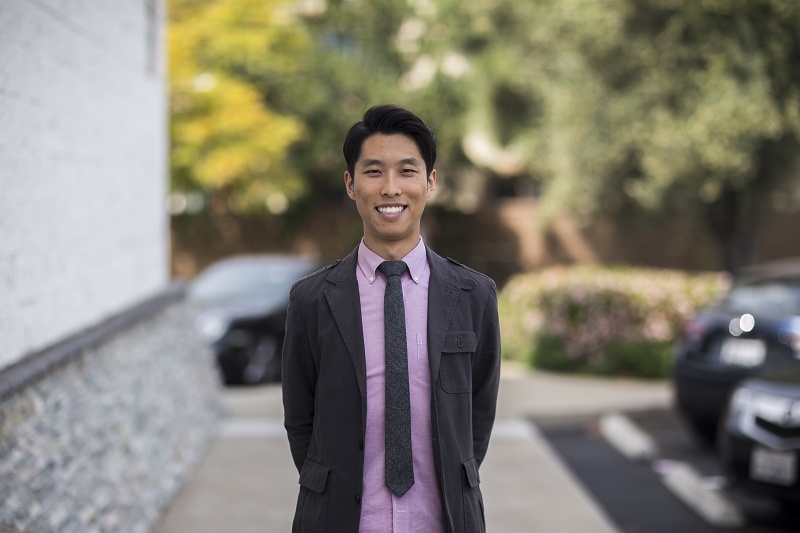

Isaac Lee is a senior at Biola University studying Music and Worship.
Isaac Lee is one of many young Korean Americans who have a heart for worship and lead worship in various settings. But a unique aspect of Lee is that he has been given the opportunity to lead worship regularly at Biola University, one of the most well-known Christian universities in Southern California. Lee is the leader of one of the worship bands that lead the chapels at Biola, and most recently, his band led worship at Biola's 'Singspiration' chapel on April 26.
Lee is also a chapel intern, which means he works directly under the chapel director, and help coordinate and facilitate the school-wide worship services.
"It just means I and the other intern would facilitate things for the chapel and see what would be helpful for the bands that are leading the chapels," Lee said. "When they plan worship sets, we would sit with them and walk through their ideas with them."
Though Asian Americans make up a significant portion of Biola's student body, Lee and his co-leader are the only Korean American worship leaders of the six bands that lead Biola's chapels, and their band is the only one comprised of Asian Americans. The bands are, however, diverse in style and ethnicity, from string quartets, to a band that even leads the chapel in Spanish sometimes, Lee said.
He also mentioned that there are several ways that his ethnic identity as a Korean American affected his worship-leading journey. To start, he mentioned an aspect that many Korean Americans are likely able to relate with.
"My mom made me learn violin when I was eight," Lee, currently a senior studying Music and Worship, said. "And she made me learn each and every song of the entire hymnal."
Though learning the instrument to such an intensity at childhood might have seemed unnecessary at the time, Lee said that "that was unbelievably helpful" for the way he leads worship today.
"I realized that I knew a lot of hymns and songs because of that discipline and practice," Lee said. "And all of those hymns that I learned helped to expand my repertoire. An average American Christian would probably know 10 hymns at max, but my library and repertoire is so much more expansive than that because of that experience."
Going deeper, he said several aspects of the Korean culture affected the way he leads worship, and that he saw some commonalities in the way many Korean churches worship.
He shared that he felt many Koreans tend to have "a more charismatic force," and that they are more expressive of their emotions during worship. Though Lee was born in the U.S., he lived a significant portion of his life in Korea, and throughout his experiences in both the U.S. and in Korea, Lee said he was exposed to diverse denominations.
"When I lived in Korea, I went to a Methodist church," he said. "And then when I came back to the U.S., I went to a Korean Presbyterian church. When I got plugged into ministry, I started attending a multi-ethnic reformed church . I also got to serve at a multi-ethnic Brethren church with mostly Anglo-Americans, and I'm in a community of Assemblies of God (AOG)."
But he saw that, though he went to a Korean Methodist church and a Korean Presbyterian church, these church congregations didn't worship in what most people would consider typical of that denomination.
"I feel like almost every Korean church is charismatic," Lee said. "A lot of Koreans like to pray out loud and like to be expressive of their emotions. I think it might come from that han, the grief in the Korean culture, and I think that passion is highlighted when we're praying."
Lee's ethnic background also affects the way he leads the team, he added. He pointed to the way that most Korean church congregations eat all together after Sunday service, and the way that community is so valued and emphasized in Korean culture.
"So when it comes to my personal chapel band, I try to incorporate being a community with them too," Lee said. "I try and initiate hang outs and outings with them, so that we're not only just getting together to practice, but we grow with each other and towards each other."
Through his experiences in the chapel band and as a chapel intern, Lee said he had opportunities to form relationships with and learn from a diverse group of people, and encouraged fellow Korean Americans to seize opportunities to meet new people and build relationships with people who are different from themselves.
"I hope Korean Americans in particular could step out of their own boxes," Lee said. "I feel that sometimes, Korean Americans seem to be too tied down to the Korean American box that we fail to see the greater landscape of the different kinds of Christians."
"I want to encourage people to see a bigger picture of the Church, befriend other people outside of the Korean community, and walk in their spiritual journey with them. I don't think it's a bad thing that Korean Americans like to congregate together, but I want us to be able to question ourselves and think, "Is there something we could be doing to be more welcoming to other communities?' Because ultimately, we're one community, and one identity in Christ."


















